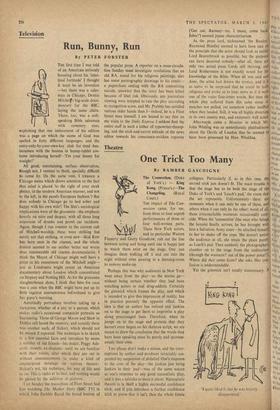Television
Run, Bunny, Run
By PETER FORSTER All good, entertaining, surface observation, though not, I venture to think, specially difficult to come by. (In the same vein, I treasure a Chicago menu which draws attention to the fact that salad is placed `to the right of your steak platter, in the modern American manner, and not to the left, in the passde European fashion.') But does nobody in Chicago go to bed sober and happy with his own wife? The film's sociological implications were of the gloomiest—the emphasis heavily on mire and despair, with all those long sequences of drunks and prowl car incidents. Again, though I run counter to the current cult of Mitchell-worship, these were striking but surely not that striking, or even new---Skid Row has been seen in the cinema, and the whole feature seemed to me neither better nor worse than innumerable old cinema documentaries. I think the Mayor of Chicago might well have a point in his resentment of the Mitchell angle— just as Londoners might resent an American documentary about London which concentrated on Stepney and Notting Hill. As for the gruesome slaughterhouse shots, I think that here for once was a case when the BBC might have put up its little ingdnue announceress beforehand to give her gipsy's warning.
Admittedly portraiture involves taking up a viewpoint, whether of a city or a person, which makes radio's occasional composite portraits so fascinating. Those of George Moore and Shaw in Dublin still haunt the memory, and recently there was another such, of Sickert, which should not be missed if repeated. The technique is to sketch itt a few essential facts and introduce by name a number of old friends—his dealer, Peggy Ash- croft, models, ex-students—until we are familiar with their voices, after which they are cut in without announcements to make a kind of counterpoint montage on various themes: Sickert's wit, his technique, his way of life and so on. This is radio at its best, and nothing would be gained by the addition of pictures.
ast Sunday the masochists of Fleet Street had fun watching The Mather Story (BBC TV) in which John Prebble flayed the broad bottom of the popular press. A reporter on a mass-circula- tion Sunday must investigate revelations that an old RA, noted for his religious paintings, also has some pornographic drawings to his credit-- a paperchase ending with the RA committing suicide, unaware that the story has been killed because of libel risk. Obviously, any journalists viewing were tempted to rate the play according to recognition score, and Mr. Prebble has satisfied various older hands than I—indeed, he is a Fleet Street man himself. I am bound to say that on my visits to the Daily Express I seldom find the entire staff in such a lather of typewriter-thump- ing, and the stick-and-carrot attitude of the news editor towards his conscience-stricken reporter ('Get out, Ramsay—no, I mean, come back, John!') seemed jejune characterisation.
As the press lord, nicknamed 'the Reader. Raymond Huntley seemed to have been cast on the principle that the actor should look as unlike, Lord Beaverbrook as possible, but the pretence, can have deceived nobody—after all, there are only two actual press Lords still thriving, and Lord Rothermere is not exactly noted for his knowledge of the Bible. When all was said and, author done, the artist had drawn the erotica, and it is ,e\pres as naïve to be surprised that he could be both religious and erotic as to treat news as if it were one of the ruder four-letter words. But then the; whole play suffered from this same sense of punches not pulled, yet somehow rather muffled when they landed. Still, it was all highly diverting; in its own caustic way, and extremely well acted.
Afterwards came a Monitor in which Mr.t John Whiting was so sententiously platitudinous about the Devils of Loudun that he seemed t have been possessed by Huw Wheldon.






































 Previous page
Previous page